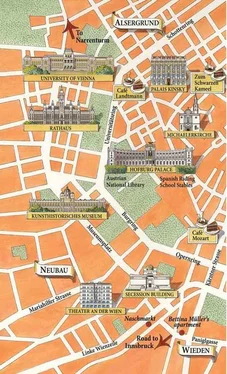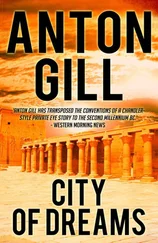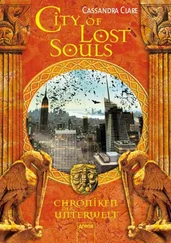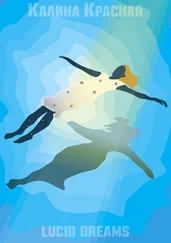Beethoven. Of course it was he. In a large hat crammed low over his forehead, stained breeches, and a long coat. Ludwig van Beethoven. Luigi’s hair was streaked with white and his face was lined. Beethoven in his fifties, near the end of his life. Sarah didn’t recognize the work he was singing. A little something he would discard in midcomposition? A last sonata?
Was she hearing the rough beginnings of what would have been—had he lived long enough—the Tenth Symphony?
Sarah, who didn’t believe in God, whispered, Oh, God, God, God . To sit next to Beethoven by a stream, in nature, the place that had always replenished this genius’s perturbed spirit? To hear him compose? Maybe she had died, after all. One thing she knew for certain now, if she were to open this door and enter it, it wouldn’t be as a ghost. Beethoven might not be able to hear her, but he would see her. He would talk to her, and she to him. Luigi, it’s beautiful. Sarah, do you think so? Oh, God, God, God.
Pollina, behind her, coughed again. Beethoven would die soon. Pollina even sooner. Beethoven was already dead. Pols was still alive.
She moved to the next door and peered through the keyhole.
A bedroom lit by hundreds of candles. Sarah could see the full moon through a small casement window. And the wasted figure of a woman on a low bed. A man stooping over her.
“My darling,” said the man. “My love. My love, you must try.”
It was Ferdinand. And the woman on the bed was Philippine. She was dying. Sarah could feel it in her own body. The pain, and the fatigue.
“I can feel the moon on my face,” said Philippine. “I can feel the pull.”
Ferdinand crossed to the window and drew a curtain across it.
“No,” he said. “ No. You must tell me how to help you. Your medicines—”
“There is no medicine for this—”
“There is one medicine,” said Ferdinand, heavily. “And you cast it upon stones. But I know you remember. You could tell me . . . you could tell me and I could make it . . . ”
Yes, thought Sarah. Tell him. She could listen. She could make the elixir of life for Pols. So what if it was a curse? She could keep Pollina with her for a little longer.
She would go through this door. She would join her body with Philippine’s and she would know how to make the cure for Pollina. Or she would force Philippine to help her. To help her truly this time. Philippine would not refuse her.
“But it is my time,” she heard Philippine say. “It is simply my time. I am ready. I have had my last dream.”
“What was it?” Ferdinand curled his large frame around his wife’s, and pulled her head onto his chest. “Tell me your dream.”
“A mother’s wish was denied, but she suffers no more,” said Philippine. “A giant has been given a choice. And now someone who is loved can be helped. But the journey to that is not finished. I have no answers for her. She must find them herself.”
“Ah, my dear . . . I don’t understand.”
But I do, thought Sarah, slumping against the door, the strength going out of her limbs. She had to crawl toward the next door. Drag herself up to look through the keyhole.
* * *
Sarah cried out.
It was her father.
* * *
She thought she had forgotten what he really looked like; that the original had long been replaced by photographs in her memory; that she could not really recall his particular scent, or the feel of his arms, or his laugh, or the color of his eyes.
But she could. It was too painful to remember. And too dear to forget.
Her dad was seated in the old green tweed armchair that had been “his” chair in their old house, the house they had sold after his death. On the table next to him was a bowl of walnuts, a cup of tea, and a transistor radio, the one he carried about with him in the garage, tuned to the classical station. He was listening now to Itzhak Perlman playing Beethoven. Dad loved walnuts, loved the violin, loved Beethoven, loved that green chair. If he was sitting in that green chair then it meant he had finished work for the day, which meant it was late, because he worked so hard, all day, and his hands were so callused, and he never got enough rest, enough sleep, enough of the pleasures in life, because he was working, and saving, saving for her, for her music lessons, and her education, saving for a day in his future when he could sit in his green chair and maybe listen to Sarah on the radio, and that day would never come because he had been killed in a car crash and all the music had stopped for him on that day. And somewhere in her, too, the music had stopped. Not the music of others, but her own music. She had never stopped studying music but she had stopped wanting to perform it, or write it. For whom would she write, if not for her father?
Sarah, kneeling by the keyhole, drew in a ragged sob. She could open this door, and she could kneel at her father’s feet and feel his rough hands in her hair. She could hear him say that he loved her, but, more important, she could say it to him.
I love you, Dad. Dad, I love you.
If she opened the door now, would she be a child again? Would she be able to change time? Stop him from driving on February fifth, when the roads were so icy? Save him?
Everything would be different. Everything.
“Sarah?”
It was Pollina. Pollina who was struggling to sit up, to stand. For a moment, Sarah could only watch her. How could she leave her father? How could she make this choice? And then Pollina stretched out a hand, feebly, and moved blindly toward her, flailing and unsteady.
Sarah knew Pollina would not say “Help me.”
And so Sarah staggered to her feet and grabbed Pollina by the hand and crashed through the fourth door.
They stood in a garden, at twilight. A large and formal garden, laid out in the Rococo style with paths of low and perfectly tended shrubberies, ornamental trees, and languid flowers, statues of tastefully draped nymphs and fauns and benign deities. In the center, a fountain splashed gently into a large, round marble basin. Sarah turned, and the door they had entered was gone. All she could see was a gazebo on a low hill.
Sarah looked at Pollina, who seemed to be dressed now in a pink and dark blue striped dress, caught up like an opera curtain in front and showing a frill of petticoats. Her hair hung in limp ringlets. Sarah raised her hands to her own head, which felt oddly heavy. She discovered she was wearing lemon-colored gloves, and some kind of plumed hat, perched up high on a tower of her hair, which was itself piled over some kind of cushion. The pins were sticking into her scalp. The tips of her gloves came away from her hair with traces of white powder. The bodice of her gown was cut low, although covered demurely with a froth of chiffon. She was wearing a corset, and something around her hips, which padded out her gown to the sides.
A gentle glissando of musical notes caught her ear. An armonica. Sarah took Pollina by the hand and followed the sound, down a swept gravel path through a grove of yew trees. This was what she had in her desperation hoped for when she had taken them through the fourth door. This was the garden of Landstrasse number 261—“a miniature Versailles” on the banks of the Danube—the home of Franz Anton Mesmer.
Vienna, and, judging from the clothing, Vienna somewhere around 1780.
Pollina, silent, clutched Sarah’s hand very hard. Her breathing was shallow and she was trembling.
As they neared the mansion, a footman in a powdered wig approached them on the path. Although he seemed somewhat startled to find them there, when Sarah gestured to Pols and inquired if Herr Mesmer might be disturbed—a matter of some urgency—he nodded and, after a quick but searching look at the shivering girl, invited them to follow him to the house.
Читать дальше












